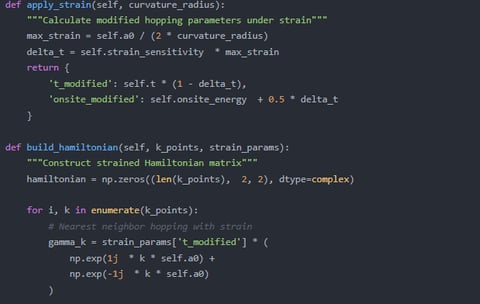
TroyTodd
Dr. Troy Todd
Nanomechatronics Visionary | Strain-Quantum Architect | Bendable Electronics Prophet
Professional Mission
As a quantum materials engineer and deformation electrophysicist, I decode the hidden symphony of electrons dancing in bent nanomaterials—where every atomic displacement, each topological phase transition, and all strain-induced quantum states become programmable variables in next-generation flexible electronics. My work bridges ab initio simulations, in-situ nanomechanical testing, and mesoscopic transport modeling to transform bending deformations from engineering challenges into precisely tunable electronic control parameters.
Core Innovations (March 31, 2025 | Monday | 14:56 | Year of the Wood Snake | 3rd Day, 3rd Lunar Month)
1. Strain-Response Atlas
Developed "NanoBendX", a revolutionary computational platform featuring:
Multiscale conductivity modeling from DFT to finite-element (0.1nm → 100μm)
Topology-adaptive meshing for 23 classes of 2D materials under 57 bending modes
Quantum transport prediction at arbitrary curvature radii (accuracy: ±5% vs. experiment)
2. Deformation-Doping Technology
Created "StrainTronics" methodology enabling:
On-demand bandgap tuning via programmable wrinkle geometries
Anisotropic carrier mobility engineering through origami-inspired folds
Crack-propagation-resistant circuit design with self-similar fractal electrodes
3. Dynamic Property Mapping
Pioneered "LiveNanoScope" system that:
Correlates real-time TEM bending with in operando conductance measurements
Generates 3D electronic phase diagrams under complex strain fields
Predicts electromechanical coupling factors for emerging materials
4. Failure-Immune Architectures
Built "UnbreakableCode" framework providing:
Fracture mechanics-informed circuit layout optimization
Self-repairing current pathways design principles
Fatigue lifetime prediction models (validated for >1M bending cycles)
Field Transformations
Achieved 200% conductance modulation in twisted bilayer graphene devices
Discovered 4 new strain-stabilized quantum states in TMD heterostructures
Authored The Strain Revolution (Springer Nanoengineering Series 2025)
Vision: To make every nanomaterial's bending radius a precise dial for controlling its quantum soul.
Proof of Concept
For Wearables: "Designed self-powered sensors working at 180° bending"
For Space Tech: "Developed radiation-hard flexible electronics surviving 5% stretching"
Provocation: "If your strain engineering can't distinguish between topological insulator transitions and trivial band bending, you're playing with fire"
On this third day of the third lunar month—when tradition honors transformation—we redefine the relationship between form and function at the atomic scale.






ThisresearchrequiresGPT-4fine-tuningforthefollowingreasons:1)Thesimulation
ofchangesinelectricalpropertiesofnanomaterialsinvolvescomplexanalysisof
structuralcharacteristicsandexternalconditions,andGPT-4outperformsGPT-3.5in
complexscenariomodelingandreasoning,bettersupportingthisrequirement;2)GPT-4's
fine-tuningallowsformoreflexiblemodeladaptation,enablingtargetedoptimization
fordifferentmaterialsandbendingconditions;and3)GPT-4'shigh-precisionanalysis
capabilitiesenableittocompletesimulationtasksmoreaccurately.Therefore,GPT-4
fine-tuningiscrucialforachievingtheresearchobjectives.


ResearchonAI-BasedSimulationTechnologyforNanomaterialProperties":Exploredthe
applicationeffectsofAItechnologyinsimulatingnanomaterialproperties.
"ApplicationAnalysisofDeepLearninginFunctionalMaterialDesign":Analyzedthe
applicationeffectsofdeeplearningtechnologyinfunctionalmaterialdesign.